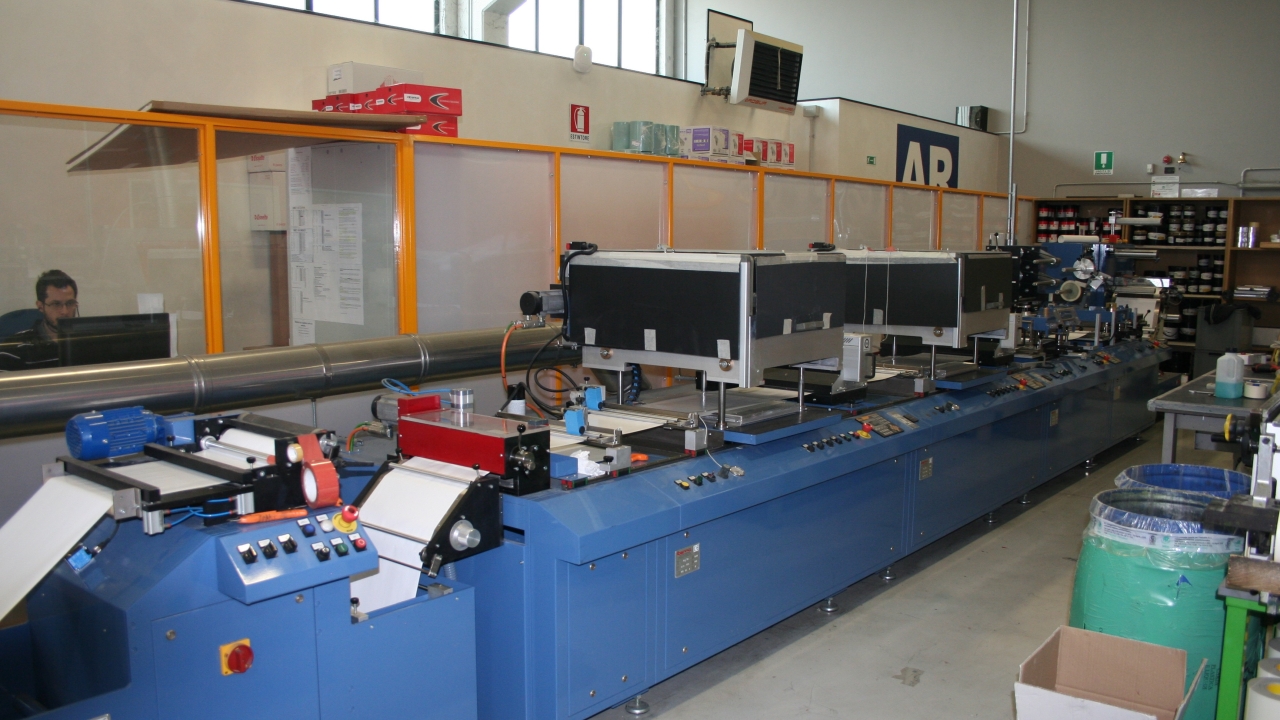Acquisition leads to growth at Ario

Milan label converter Ario has expanded its business in the high value wine and cosmetics sector with the acquisition of Turin-based Leats. The acquisition was followed by the installation of Omet’s latest iFlex flexo press at the Turin plant.
The expanded Ario group now has a 13 million EUR turnover, and hopes to reach 14 million EUR by the end of this year. The combined company has a workforce of 70 people across the two sites.
Ario’s Milan plant runs two Omet XFlex-X6 presses, both 410mm wide with eight print units. The latest was installed last year and incorporates Omet’s Twist fast-change die-cutting system. An older Omet Flexy is fitted with an in-line Vectra turret rewinder. Work is completed on Prati and AB Graphic rewinders.
In 2014 Ario Milan installed its first digital press, a Xeikon 3300, and is now considering expanding its digital capacity, possibly with an inkjet press.
Leats acquisition
The acquisition of the Leats company was a ‘perfect fit’ for Ario, says Massimiliano Marulli, managing director of Leats Etichette.
Leats was founded by Marco Priotti in 1977, and in 2000 his nephew Piero Tibaldi joined the company straight from school. Tibaldi remains an active member of management in the new Ario team.
Leats has a wide range of press types. The company runs a Gallus TCS 250 intermittent offset press with screen and hot foiling for the traditional wine label market, where structured papers are mostly used. An 8-color Gidue Combat press handles high volume jobs and some shrink sleeves, and a Berra flatbed screen press with hot foil and flatbed die-cutting is used for wine and cosmetics labels. Inspection is carried out on two Prati Jupiter rewinders with BST 100 percent inspection cameras, while an ABG Omega handles blank labels. Older machines include a Gallus EM280 and two R200 letterpress.
The most recent investment at Leats is an 8-color Omet iFlex. ‘We chose the iFlex because it is very easy to use and fast to change on short runs orders,’ says Piero Tibaldi.
‘On the iFlex we work with a small size print cylinder, which makes us cost-effective against digital. We particularly like the speed of changing from one job to another. The iVision register cameras on every print unit make it very easy to set up from a single screen. The iLight laser beam helps the operator line up the plate cylinder, after which only small manual adjustments are necessary. The fast change dies are delivered to the press on trolleys, which makes handling much easier. Now it takes us under two minutes to change jobs and with very little waste.’
The iFlex maintains register without requiring servo drives. A line shaft drives the print and converting units directly, without the use of gears.
‘Reliability was also important,’ says Tibaldi. ‘The press must run 18 hours a day without a problem. It was also easy for our operators to learn – after just two days they were printing good labels.’
The press is fitted with Vetaphone corona treater, BST/Eltromat web guide, GEW E2C UV units, turnbar, screen unit and a rail-mounted hot foil unit.
Tibaldi says that using the latest HD flexo plate technology, the dot achieved on the iFlex is ‘very near’ to an offset dot.
Working together
The acquisition of Leats gave Ario access to the full range of narrow web technologies, including letterpress, flatbed screen, intermittent offset, UV flexo and digital.
How are jobs allocated to particular presses? ‘Offset combined with screen and hot foil is used mainly for special papers in the wine market,’ explains Massimiliano Marulli. ‘There are some cases where you can use flexo for wine labels, but it is less common. The production route depends on the length of run and quality needed, but the quality of flexo today reaches almost offset quality with HD printing and new types of anilox, and this quality will increase.’
Given the different technologies at each plant, the Milan and Turin operations will increasingly focus on different kinds of labels.
‘We are focused on distinguishing the two companies,’ says Marulli. ‘The Milan Ario operation is more focused on industrial-type markets, while at Leats the focus is more on high quality value-added production, and we want to make that our showroom. This is the direction we are moving in. Our customers want high quality labels made in Italy and we need to reflect this.’
All operations are controlled through Ario’s own bespoke management information system, which covers all steps from material entry to warehousing, production and shipping. Production planning is fully electronic.
With a customer base mainly in food and wine, it is not surprising that most self-adhesive materials are paper, though pressure-sensitive film use is increasing. ‘In our Turin plant we use more film than paper because of our cosmetics industry work,’ explains Marco Borali, managing director of the Ario Group. ‘In particular we use more PE for shampoo bottles and for durable applications in the chemicals industry.’
Two years ago Ario in Milan adopted low migration inks – important for customers in the food industry – throughout its operations. The company is keeping a close eye on UV-LED developments, but definitely wants these inks to be available in low migration formats before any future investment.
And although few customers are asking for more ‘sustainable’ materials, Ario has developed a film for the cosmetics sector made from 85 percent sugar plants.
With a young and enthusiastic management team and access to such a wide range of technology, it is little surprise that Ario is predicting continued growth in the Italian market.
Stay up to date
Subscribe to the free Label News newsletter and receive the latest content every week. We'll never share your email address.


